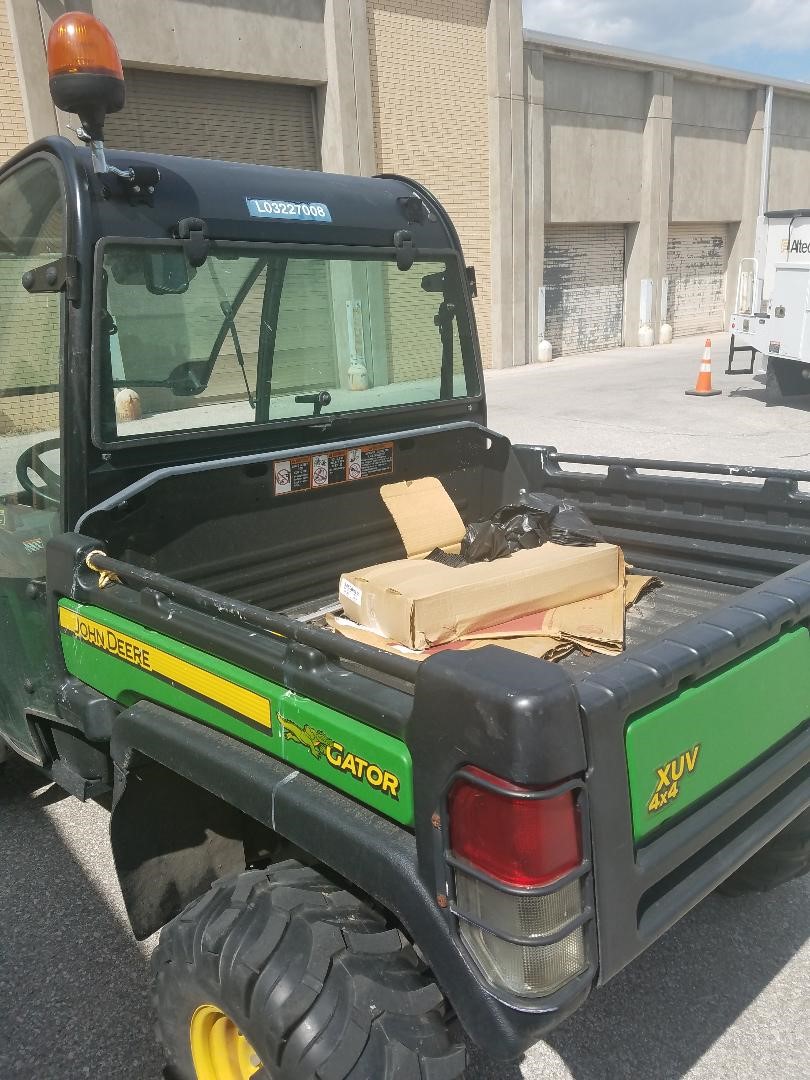by Marklin Morales
Littering and Vandalism are a common occurrence on any college campus and Haskell is no exception. This seems like it would not be an issue on a Native Campus because of the teachings of traditional bonds to Mother Earth but it is a problem.
Looking at the campus parking lots or in dormitory communal restrooms empty containers and packaging can be seen tossed on the grounds parking when trash containers are relatively close. Cigarette butts can be seen around the designated bins instead of in them. Various structures can be seen vandalized and tossed from their original fixtures and vandalism in the restroom stalls in the form of graffiti and etchings is a common. Unflushed toilets and unrinsed sinks lead to solid waste accumulating until someone else comes to clean it up. This is an all too common acknowledgment from people who do cleanup.

Facilities equipment engineer Willie Ogden and gardner Matt Stapleton do not have the duties of campus cleanup in their job descriptions but spend time daily picking up debris left by students. One of the main issues pointed out is that machinery like lawnmowers and vehicles driven can be affected by debris such as bottles that can flatten tires and break moving parts in them.
Bottles can also be smashed into smaller particles when caught in things like lawnmower blades producing a hazard to humans. Vandalism from smashing bottles into buildings is also a common sight from maintenance and facilities.

Ogden says they would rather be working on things like the road construction that needs to be completed in front of Pontiac hall. Projects like these are prolonged due to littering and vandalism. Another common issue is that of dog feces which can also be a contribution from outside visitors but mainly has been spotted occurring from students with animals. Stapleton says this also gets into machinery and can be tracked around campus causing a health hazard.
Other debris on campus spotted by maintenance are McDonalds packaging, cigar wraps, and cardboard from beverage containers. Stapleton and Ogden see this daily and have a knowledge of what happens around campus, so students should realize “their patterns are being watched” and “supervisors like Ms. Salvini do hear about this” says Stapleton who is also Haskell alumni.
Stapleton mentions the contribution hours mandated to students during his time of attendance. The contribution hours helped staff out with cleaning but also showed students to see the effects of their carelessness when they had to clean their own messes. He thinks this should be brought back in some form and could maybe be used as punishment for those caught to help this issue.
Solutions to the problem mentioned were to find students responsible, issuing fines and citations, or even pointing them out the public however, these tactics have not been used at this point. Other ideas were to have an emphasis about the effects of littering and vandalism during vision quest classes or convocation as a constant reminder to students.
“The limited staff of about 20 employees in facilities and maintenance is not enough” says Ogden to solve the problem. He also says people never really see how bad littering is on this campus as their daily clean up efforts occur early in the mornings and are often done before most arrive. If there was nothing done people would see the adverse effects of trash accumulation well before the end of one week says the staff.

In another discussion with Haskell Facilities Custodian Jeremy Shield and IT specialist Mike Daugomah, both Haskell alumni discussed the past and current situation. Daugomah mentions how things were never really that bad when he attended Haskell in the early 2000’s. Possible contributing factors to why littering is more prevalent could stem from a generational lack of Native identity and duties to their surroundings the two agree. Shields who has been working at Haskell for 21 years says cleanup programs have come and gone and some have been started only to have students graduate and the duties put on to custodians to carry on such as the maintenance of recycling bins located in the buildings he cleans. He says students put them out years ago, but he now sorts the materials and sends them to facilities that get the items to local recycling plants. Shields also sees the issue with dog droppings and littering, or “Indian artifacts” as they are known among the people who clean them up, being left around campus but has limited reach as he is only allowed to clean 30ft from his buildings.
Haskell Residential Custodian Mike Tahdooahnippah at OK hall also sees issues with broken bottles and fears they could lead to injury as he recalls being injured by on as kid. He states that sometimes he sees track runners come close to debris that is very dangerous. He recommends individual pamphlets available in the dorms reminding students the effects of not only the hazards of littering but also the health hazards associated with not keeping the restrooms clean. He sees instances of unkept urinals, toilets and sinks that could easily be controlled by personal cleanliness of your surroundings but some students just chose not to. He sees this worse some years than others and thinks it is new students learning to adjust to being away from home.
These issues also were recognized by Haskell’s Green and Restoration Committee. This committee organized a student campus clean up once a month and recently completed their “Clean up Green up” May 6th, 2018. Activities like installing rain barrels and transplanting plants as well as trash pick-up were part of the agenda.

The event encouraged students to participate in the cleanliness of their campus by offering prizes, refreshments, hammocks and a DJ to bring out students and join in. Why incentives like this are necessary to get people to come out and participate was discussed with restoration committee heads Sean Parrish, Jamie Colvin and Joe Singh.
A disturbing pattern of “students not wanting to participate in events without getting something” was addressed by Parrish; hence the prizes. Colvin and Singh pointed to “laziness” and “complacency” being a factor. Parrish also recognizes that some students just aren’t used cleaning up after themselves after leaving home for the first time. This is a situation that can be solved, according to the participants in the discussion, by understanding that there is a constant rotation of students arriving with the naivety to think its someone’s responsibility to clean up after them other than themselves.
Colvin mentions a solution similar to what facilities and maintenance did that involves mandatory clean up community service hours for students who get caught littering and other violations. The group also agrees that “constant reminders of campus pride need to be promoted and events like Clean Up Green Up will not only instill individual values but will hopefully reinforce better attitudes among their peers who can in turn encourage groups of people to simply, pick up after themselves”. She plans to increase campus cleanup activities to twice a month.
One of Colvin’s main points “we do ourselves a service surrounding ourselves with cleanliness that can not only influence our attitudes towards school spirit and pride but also show others like alumni and off campus visitors that we are carrying on tradition as Natives of Mother Earth. This in turn reflects to Creator as we, the inhabitants of Turtle Island, can bring blessings to our surroundings.”
The group consensus was that replacing negative attitudes about our cleanliness with ones like the Green and Restoration Committees message of pride in your surroundings is an issue that should spread well beyond this school. This will hopefully be achieved by acknowledging issues and opening dialogue with different departments like facilities.

